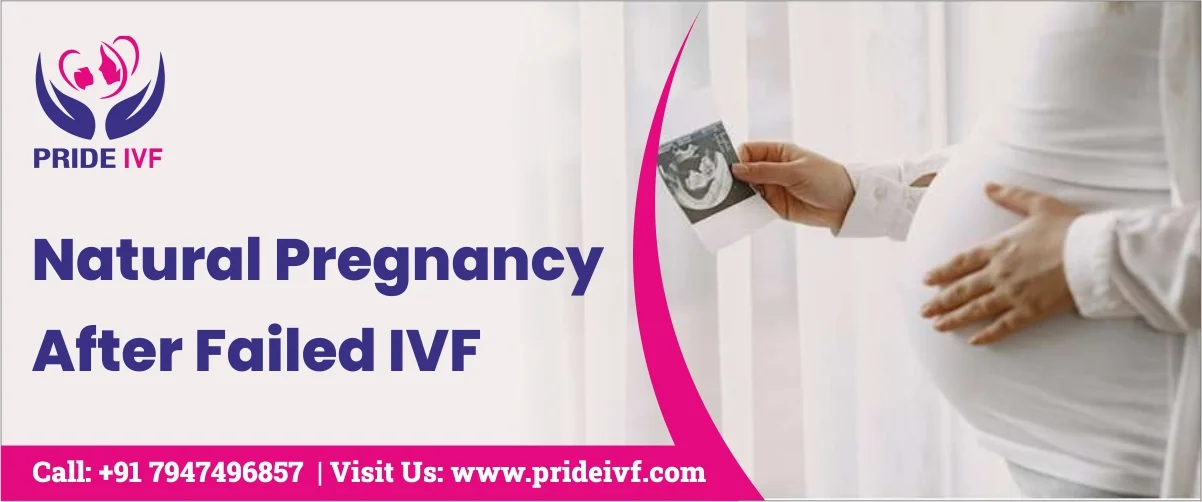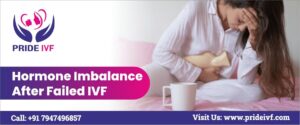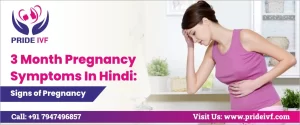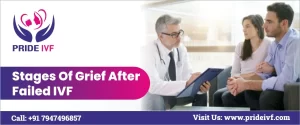Becoming a parent is a joyful journey with excitement, hope, and occasionally unanticipated difficulties. It’s not easy to deal with infertility, but with so many effective treatment options available, having a child is no longer an unrealized goal. IVF gives couples who are unable to conceive naturally hope. This post will feature testimonies of hope and resiliency from couples who, following unsuccessful IVF treatments, became naturally pregnant. Our goal at the Pride IVF Centre in Delhi is to support your reproductive journey by providing information and support as you work through this challenging procedure.
Along with her knowledgeable staff, Dr. Nidhi Sharma is always looking for ways to shorten the length of the fertility process and make it more patient-friendly. Also, she helped many of her patients to conceive naturally after failed attempts of IVF.




How a Natural Pregnancy Can Result from Failed IVF
IVF failures can increase fertility in the following ways:
- Finding the root causes of infertility problems
- Taking care of hormone imbalances
- improving the sperm and egg quality
- Failed IVF cycles might sometimes increase a couple’s chances of naturally becoming pregnant. IVF procedures can aid in the diagnosis and treatment of reproductive problems, facilitating future natural conception for couples.
Recognizing Natural Pregnancy Following IVF Failure
Without the use of cutting-edge reproductive technology like IVF or IUI, natural pregnancy after failed IVF happens. Although IVF is quite successful for many, not all infertility problems may be resolved by it. It’s critical to reassess fertility after IVF from a new angle, taking into account both traditional and unconventional methods.
Pride IVF is centered on a comprehensive evaluation of fertility. The first step in this procedure is a detailed analysis of the prior IVF attempts, looking at possible causes for their failure. These realizations frequently highlight other effective methods of conception previously overlooked in favor of IVF.
The Impact of Modified Lifestyles on Natural Pregnancy
After IVF fails, there are lifestyle modifications that can improve fertility and raise the likelihood of a naturally occurring pregnancy. Among these modifications are:
- Changing to a healthier diet
- Exercising regularly
- Controlling one’s stress levels
- Giving up smoking
- Cutting back on alcohol intake
Entire Fertility Evaluation
Pride IVF is a firm believer with a positive mindset who knows each partner’s health picture. This entails thorough examinations and testing to detect any underlying abnormalities that may be impeding natural conception, such as hormone imbalances, poor sperm quality, or difficulties related to reproductive health. We can greatly improve our chances of being fertile by considering these concerns.
Customized Lifestyle Adjustments
Lifestyle Variables are the utmost reason for infertility. Our comprehensive approach at Pride IVF includes in-depth advice on how to change your lifestyle to increase fertility. Together, our counselors, fitness coaches, and nutritionists develop individualized programs for stress management, exercise, and diet that will maximize your reproductive health.
Comprehensive Treatments for Increasing Fertility
We provide a selection of supporting therapies designed to improve fertility organically and make natural pregnancy after failed IVF possible. Studies have demonstrated that acupuncture enhances fertility by promoting blood flow to the reproductive organs and achieving hormonal balance. These therapies are combined with medical guidance to create a thorough treatment plan.
After an IVF failure, Is Natural Pregnancy Still Possible?
Many women inevitably believe that because they choose to use IVF instead of trying natural methods to conceive, they are not able to conceive. They think that means that they are not fertile enough to conceive naturally. This isn’t always the case as there are different causes of infertility. Many factors affect fertility and the capacity to conceive, including sperm conditions, egg availability, viability, and other health issues. Nevertheless, even while your odds of becoming pregnant naturally may be smaller than those of others, they are still quite real and you can still become pregnant naturally even if your IVF attempt is unsuccessful.
Lets get started
Knowing and Growing from Actual Examples
The importance of shared experiences is enormous. Pride IVF provides access to an abundance of success stories from couples who, following unsuccessful IVF treatments, were able to conceive naturally. These stories offer helpful advice on how to overcome comparable obstacles in addition to serving as inspiration.
Creating a Supporting Community
One cannot emphasize the importance of having a supporting community. Pride IVF cultivates a robust network of individuals and couples with comparable reproductive paths. This network is an invaluable tool for couples trying to conceive naturally following unsuccessful IVF cycles. It provides peer support and advice that can make all the difference.
After an IVF failure, How Is Natural Pregnancy Possible?
You may understand this by observing the different methods that women have gotten pregnant over time. Some women have conceived naturally on their first attempt, while some are during the IVF cycle itself, and a small number have also conceived during the subsequent cycles.
Throughout the entire process, the woman’s body is important. There are situations where the causes of infertility are unclear. The body starts to react favorably to IVF treatment, and the woman recognizes those signals more clearly, which may raise the likelihood of pregnancy. Trying naturally may be successful, and you can have a natural pregnancy after failed IVF without needing a second IVF treatment.
There isn’t a single, certain component that can be positively identified as the cause of the complete opposite of getting pregnant. The persistent endeavor to conceive naturally is the most common factor among all the cases. Couples who occasionally strive to see favorable results are less likely to do so. On the other hand, individuals who engage in regular and frequent sexual activity and are eager to conceive may exhibit positive outcomes even following an unsuccessful IVF cycle.
Handling Uncertainty
The inherent unpredictability of attempting a natural pregnancy after an unsuccessful IVF round can be emotionally taxing. Creating coping mechanisms to get through this uncertainty and preserve emotional health is important.
Joining support groups or online communities devoted to infertility and natural conception are a few suggestions. You could also think about therapy or counseling to deal with any stress or anxiety you may be experiencing, practice self-care by doing things that make you happy and relaxed, and figure out strategies to remain resilient and positive throughout the process.
Expert Fertility Consultation
Since every couple’s reproductive journey is different, our consultations are extremely tailored to them. Our infertility specialists are dedicated to investigating every avenue for motherhood and candidly and freely debating the advantages and disadvantages of each choice. We continuously incorporate new scientific discoveries into our practice to stay at the forefront of fertility research. Our dedication guarantees that our couples receive the most cutting-edge and successful fertility enhancement methods today.
Results
Recall that every person has a distinct narrative to share, and sometimes the most interesting stories are the ones that surprise us. Feelings of all kinds are acceptable, including optimism, fear, excitement, and uncertainty. That’s exactly how humans are. Nevertheless, have faith in your ability to bounce back and in the power of your aspirations. Natural pregnancy after failed IVF is the difficult but hopeful path. Pride IVF is committed to being there for you at every turn. Our all-encompassing, caring approach helps address all aspects of fertility, increasing the likelihood that you will become pregnant naturally. Thanks to our cutting-edge treatments, integrative therapies, and encouraging community.
Accept the chance of a natural pregnancy following an unsuccessful IVF cycle with the professional care and encouraging atmosphere of Pride IVF. Your path to parenthood is nourished, encouraged, and honored here.




